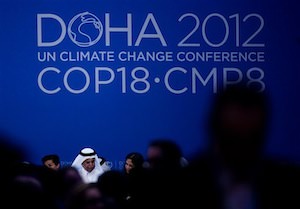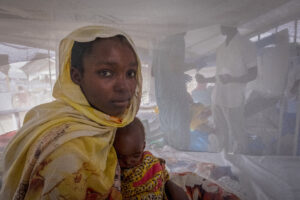Delegates Blame Qatari Leadership as Climate Talks Linger
Negotiations over a new climate deal continued into Friday night in Qatar as countries had yet to rescue the Kyoto Protocol, make commitments to help nations already suffering from global warming or propose a structure for a new worldwide agreement.
Negotiations over a new climate deal continued into Friday night in Qatar as countries had yet to rescue the Kyoto Protocol, make commitments to help nations already suffering from global warming or propose a structure for a new worldwide agreement.
Like past talks, the negotiations looked set to last for most of Saturday. Also like past talks, many delegates remained oddly hopeful that a deal could be reached. “We have worked without a break and people realize we need to go home with something,” one delegate told The Guardian.
The European Union was understood to have floated a Saturday afternoon deadline for a final agreement. Observers thought this was unlikely, as no deadlines set in the final days of the Qatari talks have been met.
Some attendants criticized the Qatari hosts for failing to maintain order and focus in the process, particularly in the task of overseeing the writing of draft texts. “There’s a cultural mismatch between the Qatari team and this process,” said Jake Schmidt, international climate policy director at the Natural Resources Defense Council. “They think deal-making is beneath them. They are not managing very well.”
— Posted by Alexander Reed Kelly.
Your support matters…The Guardian:
Rumours and counter-rumours were flying as ministers met in small groups and huddles of twos and threes to hammer out compromises. Some meetings were fractious, with delegates conscious of the need avoid a breakdown, which would be disastrous for the image of these talks with the eyes of the world upon the 195 governments meeting in Doha.
A deal to continue the Kyoto protocol beyond the end of this year, when its first set of targets expire, looked to be within grasp. In addition, an agreement to close down a parallel set of negotiations set up after the protocol came into force in 2005, at the behest of the US, which has always rejected Kyoto. Closing that strand would enable unified negotiations to begin work on a proposed new global climate change agreement, which would require emissions cuts from both developed and developing countries. It would be signed in 2015 to come into force from 2020.
Progress on other issues was still unclear on Saturday morning, including whether and how poor countries would be compensated for the damage done to them by climate change – the so-called “loss and damage” clause. Developing countries wanted a new institution and framework to deal with this, but the US was opposed to any new institution. However, a compromise was said to be possible that would allow the US to agree a new mechanism that fell short of the developing countries’ strongest demands but would ensure the end results – of compensation and assistance to poor nations – were achieved.
Independent journalism is under threat and overshadowed by heavily funded mainstream media.
You can help level the playing field. Become a member.
Your tax-deductible contribution keeps us digging beneath the headlines to give you thought-provoking, investigative reporting and analysis that unearths what's really happening- without compromise.
Give today to support our courageous, independent journalists.






You need to be a supporter to comment.
There are currently no responses to this article.
Be the first to respond.